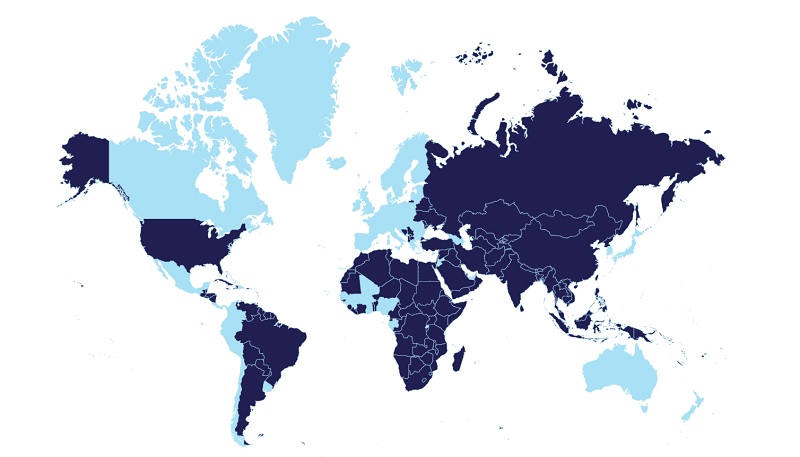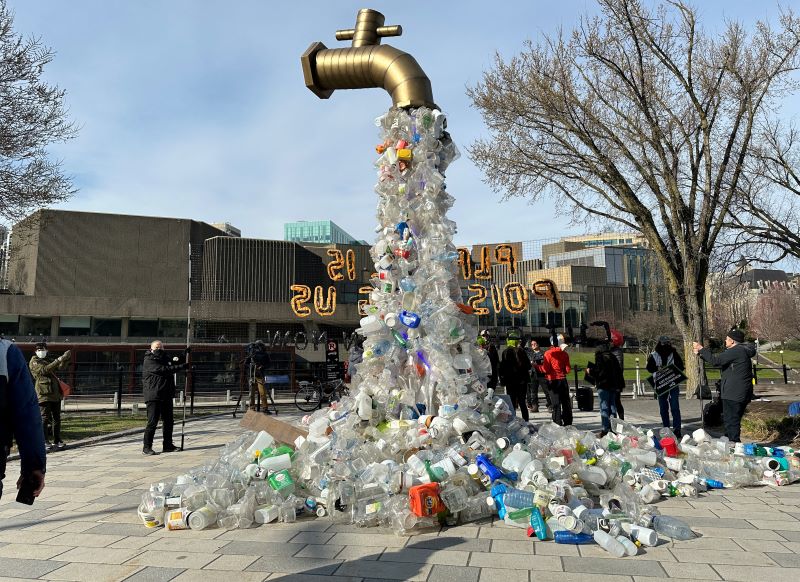After two years of fence-sitting, the US government has told campaigners that it will push for a new global treaty on plastic waste to limit the production of plastics rather than just encouraging measures like recycling.
The US government told stakeholders yesterday that, while demand side measures to reduce plastic production, consumption and waste can be part of the solution, Washington recognises that supporting goals to encourage and advance supply side measures will be critical tools, according to notes from a source at the briefing.
Three more sources at the briefing confirmed to Climate Home that the US government had shifted its position, as first reported by Reuters.
Up until now, the US has sided with Saudi Arabia in arguing for the new treaty to focus on recycling, while measures to curb production should be left up to individual countries.
The US is the only G7 member not to join the self-proclaimed “high ambition coalition against plastic pollution”.

The members of the self-described “high-ambition coalition” are in light blue
Their change of stance drew praise from environmental campaigners and anger from the plastic industry’s main trade association – the American Chemistry Council (ACC).
Industry anger
The ACC’s CEO Chris Jahn said the White House had “cave[d] to the wishes of extreme NGO groups” and was “willing to betray US manufacturing”. He warned that the Senate is likely to block the US’s entry to a plastics treaty which reflects this new position.
But environmental campaigners reacted positively. Tim Grabiel, a lawyer from the Environmental Investigation Agency NGO, said it “marks a decided shift in position” which “has the potential to salvage difficult negotiations”. But he called on the US to go further by committing to cutting virgin plastic production by 40% by 2040 – a target put forward by Rwanda and Peru at the latest rounds of negotiations last April.
FAO draft report backs growth of livestock industry despite emissions
Dennis Clare, a plastics negotiator for the Pacific island nation of Micronesia, told Climate Home that the new US position was a “major development with the possibility of turning the tide towards a much more ambitious treaty”.
Years in the making
The journey towards a global plastics accord began at the United Nations Environment Assembly in Nairobi in 2022 when all governments agreed to set up a treaty “to promote sustainable production and consumption of plastics”.
Since then, negotiators have held four rounds of talks, with the fifth and supposedly final due to take place in the South Korean city of Busan from November 25 to December 1. Any agreement struck there would then be signed off at a diplomatic conference a few months later.
Sign up to get our weekly newsletter straight to your inbox, plus breaking news, investigations and extra bulletins from key events
Ahead of those talks, the European Union has warned that “delaying tactics” from some nations will make it “very difficult” to agree a treaty in Busan.
The European Commission blamed “mainly major oil producing countries” for slowing negotiations while a Latin American negotiator told Climate Home in June that these delaying tactics were coming from the Like-Minded Group, which includes Russia and Saudi Arabia.
Production or just pollution?
One key divisive issue is whether the treaty should be limited to halting plastic pollution or also set targets to reduce the rising plastic production that is causing the problem in the first place. Besides environmental contamination, plastic contributes to planet-heating emissions as its manufacture relies on fossil fuels.
Powerful governments like Russia, Saudi Arabia and India have opposed targets to limit plastic production, preferring to focus on promoting recycling and keeping plastic waste out of the sea. The US and Iran have also tried to water down the treaty’s ambition.
Key UN report lends weight to Pacific plan for shipping emissions levy
On the other hand, a coalition of countries launched an initiative called “Bridge to Busan” aimed at reaching an agreement with targets to reduce plastic production. Plastics are made from oil and gas, and their production is a significant and growing source of greenhouse gas emissions.
Micronesia is one of the nations leading the Bridge to Busan coalition. Their negotiator Dennis Clare told Climate Home on Thursday that he hopes the US now signs up “and seeks to play a leadership role on addressing plastics production, which is the cornerstone of any effective treaty on plastic pollution”. The US has not indicated whether it would support this initiative.
There are also splits over the level of detail the treaty should include, how legally binding it should be, and what a financial mechanism to support government efforts to tackle plastic pollution should look like, according to an EU summary from June.
While some countries want a new dedicated fund, others including Gulf nations want to use an existing institution like the Global Environment Facility to channel finance. Additionally, Ghana has proposed a global fee on plastic production.
